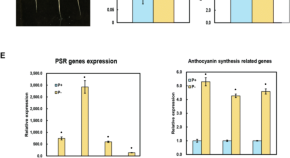High transcriptome plasticity drives phosphate starvation responses in tomato
Authors (first, second and last of 7)

Collection
Plants acquire essential macro and micronutrients from the soil for growth and development. The macronutrients include nitrogen, phosphorus, potassium, sulfur, magnesium, and calcium, while the micronutrients consist of iron, manganese, zinc, boron, copper, molybdenum, chlorine, and nickel. Deficiencies of these essential nutrients cause retarded plant growth and reduced productivity. However, excess uptake and accumulation of non-essential ions such as sodium, aluminum, cadmium, lead, and essential microelements such as zinc and copper result in cellular toxicity, compromising plant growth and development. Plants, including crops, have evolved various mechanisms to deal with nutrient deficiencies and ionic stresses, including high salinity and heavy metal toxicity. Recently, significant progress has been made in identifying ion transporters and the signaling pathways controlling ion uptake, translocation, homeostasis, and detoxification. However, novel genes and pathways essential for plants’ responses to ionic stresses and nutrient deficiencies are yet to be identified and their intricate biochemical and molecular mechanisms still need to be further elucidated.
This special issue aims to publish high-quality papers uncovering the molecular and biochemical mechanisms underlying plants’ responses to nutrient deficiencies and ionic stresses. In addition, research on genetic manipulation of essential genes and pathways for improving crops’ ionic stress tolerance and nutrient use efficiency in crops is also encouraged.
Texas Tech University, USA, Huazhong.Shi@ttu.edu
Cornell University, USA, jl233@cornell.edu
Shanghai Center for Plant Stress Biology, Center for Excellence in Molecular Plant Sciences, Chinese Academy of Sciences, China, mglei@sibs.ac.cn








